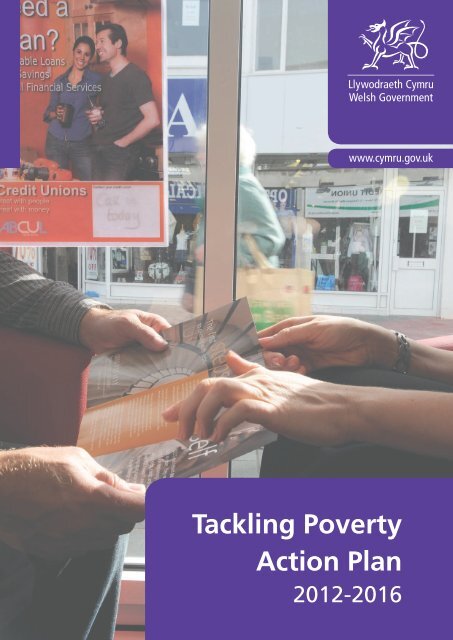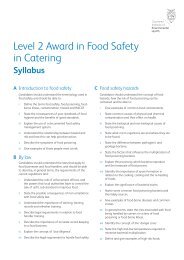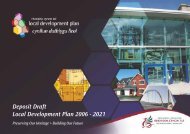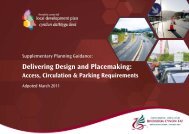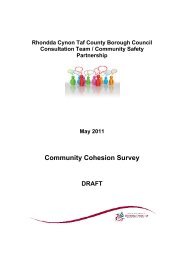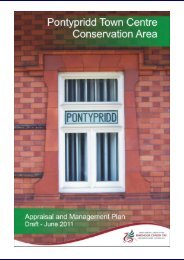Tackling Poverty Action Plan
Tackling Poverty Action Plan
Tackling Poverty Action Plan
- No tags were found...
You also want an ePaper? Increase the reach of your titles
YUMPU automatically turns print PDFs into web optimized ePapers that Google loves.
<strong>Tackling</strong> <strong>Poverty</strong><strong>Action</strong> <strong>Plan</strong>2012-2016
Copies are also available in Welsh.Printed on recycled paperPrint ISBN 978 0 7504 7010 0Digital ISBN 978 0 7504 7017 9© Crown copyright 2012WG14688
ContentsPageForeword 1Introduction 3Section 1: Preventing <strong>Poverty</strong> 4Section 2: Helping People out of <strong>Poverty</strong> 13Section 3: <strong>Action</strong> to Mitigate the Impact of <strong>Poverty</strong> 19Joining up across Government 25
Our <strong>Tackling</strong> <strong>Poverty</strong> <strong>Action</strong> <strong>Plan</strong>ForewordOur Commitment to social justice and equality of opportunity makes itessential in the current climate that we continue to drive forward tacklingpoverty by prioritising the needs of the poorest and protecting those most atrisk of poverty and exclusion.We do so against a challenging economic environment where prospectsremain very uncertain and with a severe risk of weakening prospects for jobsacross the UK and internationally. There are also clear challenges to theWelsh and UK labour markets associated with the UK Government’sprogramme of fiscal austerity. In this context the welfare and benefits reformsintroduced by the UK Government threaten to drive many of the mostvulnerable members of our society into severe poverty and to undermine ourefforts to reduce poverty overall. Rural areas can also experience higher ratesof poverty. The Joseph Rowntree Foundation estimates that it costs 10-20 percent more to achieve a basic adequate standard of living in rural areas thanurban areas mostly because of increased transport and heating costs.We cannot do everything that needs to be done but we will do all we can andwe will do it well. We will do it not just because it is right, though a life freefrom poverty is indeed a civil right, but because it makes financial andeconomic sense. <strong>Poverty</strong> results in poorer educational, health andbehavioural outcomes for individuals. <strong>Poverty</strong> imposes enormous costs onsociety from lower economic productivity, reduced social cohesion andincreased demands on public services such as health care and children’sservices. The lower level of skills; poor health and poverty of ambition thatdeprivation brings with it are a brake on the potential of the Welsh economy.Sustainable development lies at the heart of the Welsh Government’s agendafor Wales. This means that when faced with hard choices we choose theoption that works best for the long term, such as investing in better earlyeducation and support for families now to prevent social hardship later; orhelping Welsh citizens and businesses to use energy more efficiently toprepare for future price rises. We need to make sure that we design and buildorganisations, infrastructure and public services which will serve us for thelong term, which are accessible to everyone, and are affordable to run andmaintain. This plan sets out how we are balancing the need to tackle theimpacts of poverty now, with the need to tackle the issues which will causepeople to be in poverty in the future.Our <strong>Tackling</strong> <strong>Poverty</strong> <strong>Plan</strong> and our Strategic Equality <strong>Plan</strong> will work togetherto achieve better outcomes for everyone in Wales. Our <strong>Tackling</strong> <strong>Poverty</strong>actions will supplement the delivery of our statutory Child <strong>Poverty</strong> Strategyand build on complementary strategies such as the Fuel <strong>Poverty</strong> Strategy.1
Given that many of the factors that influence poverty directly and immediatelyare outside our control, it is even more important that we optimise what wecan do and that we can measure the outcomes of those actions. Theeffectiveness of our actions will depend on our capacity to do things differentlyand to maximise the impact of what we do by being more focused and joinedup across departments and with our partners.The challenges are not ones that Government can meet on its own. We willnow engage even more closely across all sectors to take forward and developthe actions in this plan. We will refresh and report progress on the plan in 12months.We do not accept that a general increase in the wealth of society willinevitably “trickle down” to individuals and communities in poverty. There aremultiple barriers that prevent people from fulfilling their potential and we musttackle these across our portfolios. We must demonstrate that we direct ourefforts to the people and places where they will have the greatest impact.This is not about putting a sticking plaster of additional actions on topof existing programmes. It is about tackling poverty through everythingwe do.Carl Sargeant AM Gwenda Thomas AMMinister for Local Government andDeputy Minister for ChildrenCommunitiesand Social Services2
IntroductionIn keeping with our commitment to long-term well being the key objectives ofour <strong>Tackling</strong> <strong>Poverty</strong> actions are:to prevent poverty, especially through investment in giving childrenthe best possible start in life. From conception through to earlyadulthood, our aim will be to reduce inequality at the earliest possiblestage and break the link between socio-economic disadvantage,educational under achievement and the impaired life chances that flowfrom these;recognising that the best route out of poverty is through employment,we will continue to help people to improve their skills and enhancethe relevance of their qualifications. We will also remove otherbarriers to employment – from practical barriers such as theaccessibility of transport and buildings to less tangible barriers such aspoverty of aspiration - helping people to move on to and up theemployment ladder;at the same time, we will increase action to mitigate the impact ofpoverty here and now. We recognise that for more and more people,even being in work will not guarantee that they can escape poverty.We can act to improve the quality of life of these communities, familiesand individuals.<strong>Action</strong> in these areas must be taken forward in ways which are mutuallyreinforcing. Good quality, affordable childcare should help children to reachimportant developmental milestones: at the same time it will createemployment for some and remove a barrier to employment for others. Early,targeted action to prevent young people from falling out of education, trainingor employment should benefit them directly but should also benefit the nextgeneration. Advice which helps people deal with debt, or get on-line, shouldbe a basis for enabling them to manage their finances sustainably and usenew skills to increase their engagement in work and society.For each of these three objectives, this plan gives examples of what theWelsh Government has put in place previously, illustrating a long standing“track record” of commitment to social justice and equality; what thisGovernment is already doing to tackle poverty; and what we will now do inaddition, to place an even greater priority on action that will have a positiveimpact for the most vulnerable and disadvantaged.3
Section 1: Preventing poverty and making it less likelyover the longer-termThe early years are a critical time for children’s physical, cognitive, languageand social and emotional development. Research is also beginning to showthat what happens to children in the early years can have physiological effectsthat are lasting. <strong>Poverty</strong> begins to exert its effects from a young age; by age 5children from the most economically advantaged groups have been found tobe more than a year ahead in vocabulary tests compared to those fromdisadvantaged backgrounds.If we are to make a difference in the longer term outcomes for children andfamilies in poverty, we must offer support earlier and sustain that support untilfamilies become resilient and self-sufficient. Low income and debt makesfamily life more difficult and it becomes harder to manage stressful events.Families in poverty require different levels of support. Families with complexproblems, for example substance misuse, need more intensive and acuteservices.Education has a fundamental role in helping to lift people out of poverty and inprotecting those at risk of poverty and disadvantage. There is a strong linkbetween poor educational attainment, low skills and poor health andwellbeing. As a Government we are committed to tackling poverty by raisingaspirations; improving standards in education; increasing skill levels andreducing inequalities in health and wellbeing.In addition to specific funding programmes and grants, such as thosementioned below, approaches that combine whole school improvement withspecific pupil-level interventions will be necessary to ensure that schoolsimprove overall and that attainment gaps narrow.Our track recordThe Welsh Government has based its approach to child poverty on therights of children and young people in accordance with the Rights ofChildren and Young Person’s (Wales) Measure 2011, recognising thattackling poverty is as much about improving children’s wellbeing as it isaddressing income poverty. The Children and Families (Wales)Measure 2010 placed duties on public bodies to ensure the right toplay and the right to participate for children and young people.The Welsh Government is committed to providing Free Breakfasts toall primary school age children in maintained schools in Wales. This isto help improve the health and concentration of pupils, and to assist inthe raising of standards of learning and attainment. This provision is ofparticular importance to children in poverty who are at particular risk oftheir ability to learn being adversely affected by inadequate nutrition.4
Most of the funding for schools goes through the Revenue SupportGrant to local authorities, which is calculated using a formula thatincludes a deprivation measure - that means more funding for localauthorities and schools in poorer areas. Last year, the HigherEducation Founding Council for Wales, who already have demandingtargets to widen access to higher education amongst deprivedcommunities, rejected Welsh universities’ initial tuition (student) feesplans because they were insufficiently ambitious in meeting ourwidening access ambitions. <strong>Tackling</strong> disadvantage is deeply ingrainedthroughout our spending patterns and interventions.The Educational Maintenance Allowance Scheme has been continued.The aim of the Allowance is to address the link between low incomeand low participation by providing a financial incentive to young peopleaged 16 - 18 years from low-income households to remain in full-timeeducation beyond compulsory education.What we are doing nowEarly yearsWe know that interventions to support children in the early years arehighly effective in tackling the effects of deprivation on educationalattainment. That is why we are investing significantly in theFoundation Phase – a developmental curriculum for 3-7 year olds,which is now fully implemented throughout Wales. The FoundationPhase encourages children to be creative, imaginative and to have fun,and makes learning more enjoyable and more effective. TheFoundation Phase is based on the principle that early years' provisionshould offer a sound foundation for future learning through adevelopmentally appropriate curriculum.The Foundation Phase is a universal entitlement; by engaging youngchildren in learning, whatever their background, circumstances andparticular needs, we aim to ensure all children are given the bestpossible start and the confidence to develop their full potential.The Foundation Phase builds on the Flying Start Programme, whichis targeted on children in the most deprived areas. Flying Start providesfree quality part-time childcare for 2-3 year olds; an enhanced HealthVisiting service (where the Health Visitor caseload is capped at 110children); access to Parenting Programmes; and access to Languageand Play sessions. These are universally available to all children aged0-3 and their families in the areas in which it runs.5
Early support for children and familiesFamilies First aims to spur improvement in local systems of supportfor families, particularly those living in poverty. It requires localauthorities to improve and innovate in relation to support for childrenand families and more appropriately tailor services to local need. Tounderpin its delivery more effective multi-agency working andintegrated services are needed to provide holistic support to childrenand families across the levels of need, but with a strong emphasis onearly support and prevention. All local authorities have receivedadditional funding in this financial year, and will in 2013/14, to deliver ata local level the Families First programme, including its focus onfamilies with disabled children and/or young people. Up to £87m hasbeen allocated to Families First from 2012-2014.Families with complex problems such as substance misuse will needmore intensive and acute services. The Integrated Family SupportService will target such families and multidisciplinary teams will workearlier and intensely with children and families to affect change. Thesupport includes debt management; housing (to minimise eviction andhomelessness) and return to work training and better engagement withkey health and education services. From Spring 2012, IntegratedFamily Support Services will be available in 10 local authority areasand the programme will be available across all of Wales by 2013. Theservices will support over 5,500 looked after children and care leaversto improve life chances and maximise wellbeing. They will aim to dothis by providing stability, building resilience and will promote andencourage them to achieve through education, training andemployment towards independent living. These services will besupported by early intervention programmes such as Flying Start andFamilies First.We placed a duty on local authorities to work with local statutory,voluntary and community bodies to ensure that, as far as is practicable,there is flexible, and sufficient childcare available locally to supportparents. Funding is provided via the Local Authority Revenue SupportGrant to support this, and in addition, we provide a grant of £2.3m perannum to local authorities to help in developing out of school childcare,and in particular after school provision.Play is central to the physical and social development of children andcan help to contribute to longer term improvements in both health andeducational outcomes. This year we will commence the duty on LocalAuthorities to assess and secure sufficient play opportunities forchildren in their areas, and support them in doing so.The Welsh Government has developed and adopted NationalStandards for Participation, for all providers of services to children andyoung people. Local authorities and key delivery partners are requiredto produce a Local Participation Strategy, so that children and young6
people have opportunities to have their views heard and to be involvedin decisions that affect their lives at the local level.Fairer Outcomes for All is the Welsh Government’s strategic actionplan for reducing inequities in health. In response to this, all LocalHealth Boards are required to identify, and take action to address,inequities within their areas. By 2020, we aim to improve healthy lifeexpectancy for everyone and to close the gaps in health inequitiesbetween social groups from the most to the least deprived.We will make extra effort to bring families into contact with GPs andextend GP hours linking them to a range of services. The process ofdeveloping ‘localities’ will strengthen the population focus of generalpractice, better interpreting the needs of those communities andmatching resources to need. A new annual reporting system will helpLocal Health Boards to identify and act upon variation in serviceprovision and performance.The Designed to Smile, service specifically targets inequalities in oralhealth. The scheme aims to prevent children’s teeth decaying andleading to dental loss and disfiguration that in adulthood can have adetrimental effect on employment prospects. The Welsh Governmentwill shortly be issuing for consultation our national oral health planwhich strengthens our practical actions to combat tooth decay.We will also use school nurses to reduce inequality in the uptake ofcertain sorts of immunisation by teenagers. We are taking action tomore rapidly reduce road traffic accident-related child death and injuryin lower socioeconomic groups. We also provide parents withresources through Flying Start to enable them to reduce accidents andinjuries in the home.Teenage pregnancy is often associated with poor health and socialoutcomes for both the mother and the child. Young mothers are morelikely to suffer postnatal depression and less likely to complete theireducation. Children born to teenage parents are less likely to bebreastfed, more likely to live in poverty and more likely to become ateenage parent themselves. Public Health Wales working with LocalHealth Boards are taking action to reduce teenage conception rates.This includes offering long acting removable contraception to specificteenagers.We will report on teenage conception rates, low birth weight and dentalcaries at age 5 and 12.Early support is important for individuals at all ages. Theimplementation of the Mental Health Measure will play a key role instrengthening services in the community and improving links withspecialist services. This will be particularly relevant in providing support7
for patients with mental health issues related to financial or redundancyissues.The new mental health strategy, Together for Mental Health, aims toeliminate inequalities in access and to ensure those most vulnerableservice users themselves are heard and acknowledged. Outcomemeasures and indicators are currently being developed for the strategy.Narrowing education attainment gapsThe Welsh Government’s overall reforms to raise school standards play a keyrole in reducing the impact of poverty on educational attainment. By raisingthe performance of all schools, and by reducing the variations found betweenand within schools, standards of learning will increase for all learners, andthose from deprived backgrounds will benefit most. This, in turn, will equipyoung people and adults to reach their potential and secure sustainableemployment. Secondary school banding has helped us identify which schoolsneed support, and enabled the consortia to differentiate the support availablefor schools in specific circumstances.All four regional education consortia have action plans in place for allschools in bands four and five. These action plans include a practicalfocus on steps towards improvement, with financial support from theWelsh Government of £10,000 to support individual action plans.Good literacy and numeracy skills are essential to improving standardsin education. The National Literacy Programme for Wales sets out theactions that will be taken by the Welsh Government and our partners toachieve a step-change in standards of literacy over the next five years.Amongst the key initiatives in the Literacy Programme are targetedsupport for pupils; support for teachers’ professional development; thesharing and consistent use of best practice; a statutory NationalLiteracy and Numeracy framework; and development of nationalreading tests. Our National Numeracy Programme will be published inthe Autumn.We also recognise that as children and young people move through theschool system, they will have a variety of needs and preferences. Our14-19 Learning Pathways policy has been developed to ensure that alllearners have access to a wider choice of general and vocationalcourses at both Key Stage 4 and Post-16. It also secures anentitlement to support learners to overcome any barriers to theirlearning or to remaining engaged in learning.In the short term, the Pupil Deprivation Grant is a key opportunity forschools to invest in effective approaches for tackling the impact ofdeprivation. Under the Pupil Deprivation Grant and the SchoolEffectiveness Grant, there is an additional investment of some £58million going to schools and local authorities in 2012-13 and a further8
£68million in 2013-14 and 2014-15 respectively. Our guidancefor schools strongly encourages schools in areas of high socioeconomicdisadvantage to link and work closely with the CommunitiesFirst Programme, to maximise the resources available for initiatives toraise school standards and narrow the educational attainment gap.For those choosing to continue their studies at a higher level, theWelsh Government believes that access to Higher Education should bebased on the ability to learn rather than the ability to pay. Our studentsupport package and requirements for tuition fee plans are designed toremove financial barriers and to encourage applications to HigherEducation from disadvantaged groups. Widening access to HigherEducation is a fundamental aim of For Our Future and a core aspectof the Welsh Government’s drive for social justice.The Assembly Learning Grant for Further Education is a meanstested grant aimed at adults aged 19 years and over to help with thecost of continuing with, or returning to, further education. There arelevels of support based on a household income threshold of £18,370.Eligible students can receive payments of up to £1,500 if they arestudying full-time and up to £750 if they are studying part-time.We know that very often it will be the same young people we need totarget in order to narrow the attainment gap between pupils from deprivedbackgrounds and their peers who will require support because they are atrisk of disengaging from education, employment and training. Ourapproach to reducing the number of 16-24 year old disengaged youngpeople in Wales is set out in pages 14—17 below.What we will do in additionAn extra £55 million has been allocated to support the expansion ofFlying Start over the three financial years 2012-13, 2013-14 and 2014-15, to double the number of children benefitting during this term ofGovernment.We will target the expansion of Flying Start on concentrations offamilies with children aged 0-3 living in Income Benefit householdsacross Wales. As detailed in the Strategic Equality <strong>Plan</strong>, the FlyingStart Team will work with stakeholders to implement new systems toreport on take-up of elements of the programme by some of the“hardest to reach” groups including ethnic minority families. Thisguidance will also include a requirement on local authorities to identifyhow they will address those needs.We will forge stronger links between programmes, for examplebetween Flying Start and the Foundation Phase and between FamiliesFirst and Communities First. We will work to ensure thatCommunities First links effectively with education and health bodies to9
increase the reach and impact of mainstream education and healthfunding in our most deprived communities. Following consultation in2011, Communities First has been relaunched (from April 2012) as aCommunity Focused <strong>Tackling</strong> <strong>Poverty</strong> Programme which will continueto support and encourage local action to address the long-term causesand effects of poverty in the most deprived areas in Wales. There willbe fewer, larger Communities First areas (known as Clusters) so thateffective partnership working with key service providers and otherstrategic stakeholders will be simplified. A new monitoring framework,based on Results Based Accountability, will demonstrate thecontribution made by the programme to three key outcomes:Prosperous Communities, Learning Communities and HealthierCommunities.Team around the familyWe are already committed to delivering multi-agency support for familieswho need it, tailored to the particular issues they face and putting families,and not the services involved, at the very centre of Teams Around theFamily. We will do this through our Families First and Integrated FamilySupport Teams, ensuring the support of the social services, healthservices, education, justice and the Third Sector. The indications are that awhole family approach, with a strong emphasis on preventative and earlysupport, will be both more effective and more cost effective in achievingbetter outcomes; but it involves a step change in the approach of theWelsh Government and other service providers. A cross-Governmentgroup supporting the Deputy Minister for Social Services and Children willtake this forward. <strong>Action</strong>s will include:A three-year evaluation contract of Families First will be awardedthis summer. The independent evaluation team will report annuallyon the progress of Team Around the Family approaches beingdeveloped and implemented at local level as a key component ofthe Families First programme. (The approaches to Team aroundthe Family are underpinned by the five-year Families First planssubmitted this year by Local Authorities.) The Families First team isalso establishing national ‘Learning Sets’, including one for Teamaround the Family approaches, with Local Authorities and partnersin July this year. Learning Sets will provide structured opportunitiesto share learning around the development and implementation ofkey elements of Families First. These will be supplemented by casestudies and reports on the Families First website.We will work with the Public Service Leadership Group to provideleadership at local and regional level for the development ofapproaches which join up services around the needs of theindividual and the family. We will also support more organisations tomake the financial case for adopting integrated “team around thefamily” approaches. We will establish by mid-2013 outlinecharacteristics for the various Families First Team around the10
Family interventions. By mid-2014, we will develop a set of nationalstandards based on the evaluation evidence.The actions identified in Sustainable Social Services will removeunhelpful boundaries between adult and children’s social services. Thiswill deliver a programme of transformation in the delivery of socialservices, to meet the needs of our most vulnerable and disadvantagedpeople.Educational attainmentThe School Standards and Organisation Bill will ensure that primaryschool free breakfasts are available in all maintained schools unlessthe Local Authority cannot reasonably achieve this.There is strong evidence that particular groups are under-achievingand this includes disabled children, boys and certain ethnic minoritygroups including Pakistani, Bangladeshi, African Caribbean and GypsyTraveller children and young people. Within the Strategic Equality <strong>Plan</strong>there are detailed actions to address this:We will improve the outcomes for disabled children and youngpeople and those with Special Educational Needs through thereform of the Additional Learning Needs statutory framework.We will analyse information and identify issues whereinterventions are needed to drive up attainment amongst thoseethnic minority groups who are underachieving includingpatterns of school exclusions.ChildcareAccess to affordable childcare that is of a quality that ensures that thedevelopmental outcomes for the child are improved is also central tosupporting parents back to work. Successive reports have highlighted that thisis still one the biggest barriers to people in poverty who are looking to enterthe workplace. Access to high quality affordable childcare has therefore beenidentified by Ministers as a key priority for tackling poverty.We will examine ways of increasing the availability of affordable, qualitychildcare, building on statutory local authority assessments of need andengaging with the private sector, social enterprises, professional bodies andothers. A cross - Welsh Government group has already begun looking at howwe can integrate childcare provision across Early Years from pre-birth to 7years, including Flying Start and Foundation Phase. This work will beextended to further cooperation to develop an integrated approach to servicesand 'wrap-around' care outside of core school hours for children from 8-16,including Out of School Childcare Grant and free school breakfasts. We will:11
undertake a more detailed analysis of the most recent ChildcareSufficiency Assessments and further develop the cross departmentalwork around early years to encompass the priority of affordablechildcare, in the context of reducing levels of poverty;undertake an analysis of the financial assistance currently available toparents through local and Jobcentre plus programmes;establish where there are gaps in childcare provision and make earlyrecommendations on how the supply of childcare can be stimulatedand supported;explore where key programmes can be used to maximise the ability forparents to access childcare support, including the role of local FamilyInformation Services;make initial recommendations on the type of support that we couldprovide parents; indicative costs and potential models for delivery.12
Section 2: Helping people to take up job opportunitiesand earn an incomeGrowth and sustainable jobs are at the heart of the Programme forGovernment and jobs and the economy are the Welsh Government’s overridingpriorities. Employment offers a high level of protection against povertyfor individuals and families. There is a strong correlation betweenqualifications and skills, employment and earnings. One of our objectives inthe Strategic Equality <strong>Plan</strong> will be to work with partners to identify andaddress the causes of the gender, ethnicity and disability pay andemployment differences.Our track recordOver the six years to 2010, Wales made great strides in improvingqualification levels in Wales and the overall skills mix. The proportion ofthe working-age population with a degree or higher qualification roseby 5.2 percentage points, whilst the proportion with no qualifications fellby 4.9 percentage points.There have been improvements in apprenticeship completion rates(from 54% in 2006/07 to 80% in 2009/10).Over the last decade the ReAct programme has established a strongtrack record for helping people back into employment. An internalevaluation of delivery for the period from 1 October 2008 to 31November 2011 shows that the proportion of participants who foundnew employment as a result of ReAct was 76%.GO Wales is a graduate employability and skills programme,sponsored and managed by the Higher Education Funding Council ForWales and delivered by Higher Education institutions across Wales.The programme has established credibility with employers with morethan 3,500 people so far benefitting.Investing European Union funding, particularly the European SocialFund, in actions to increase employment and tackle economic inactivity(30 projects with a combined value of over £280m) and to raise skillslevels. Our European programmes also support social enterprise,financial inclusion and locally-led approaches to development whichhelp to tackle poverty and exclusion.What we are doing now The risk of poverty for children in workless families remains high, at 58per cent, which is considerably above the average of 22 per cent.Therefore, although the Welfare to Work agenda remains a matter forthe DWP, we are determined to do what we can to boost skills, andcreate and safeguard jobs. We are working with our partners in local13
government, the third sector, the Work Programme Providers,employer bodies and the Department of Work and Pensions throughthe Joint Employment Development Board to coordinate support for theunemployed.Traineeships for 16-18 year olds and Steps to Employment for 18 plussupport young people and adults to gain confidence, motivation,improve their skills and gain work experience to enable them to entersustained employment.Help for adults to gain basic skills has been remodelled with the launchof ‘Essential Skills in the Workplace’.Jobs Growth Wales (helping young people into employment). JobsGrowth Wales is a key commitment within the Welsh Government’sProgramme for Government and will create 4,000 job opportunitiesacross Wales for 16-18 year old who are not in education, employmentor training as well as those unemployed young people, aged 18-24.The Programme will also provide a package of support for theindividual from day 1 of unemployment (up until they become eligiblefor the Department of Work and Pension’s Work Programme) with thefocus on supporting the individual to progress into sustainedemployment or where appropriate an apprenticeship. The scheme willoffer young people work experience for a 6-month period. This will bepaid at or above the National Minimum Wage for a minimum of 25hours per week.We have built upon the success of the acclaimed ProAct schemethrough Skills Growth Wales, a £30m extension (including £17mEuropean Social Fund of which has now been approved and will beopen to new applicants until 2015. This will support 200 companies,contributing to the creation of up to 3000 new jobs.Apprenticeships in Wales are open to everyone and innovations forlearners and employers are motivating engagement. Pathways toApprenticeships and the highly successful Young Recruits Programme,together prepare the supply of highly skilled apprentices whilststimulating demand for apprenticeships from employers. The EconomicStimulus Pack has provided additional investment £4.23m to the YoungRecruits Programme, offering support to employers for additionalapprenticeship opportunities where there is a need to maintain ahighly-skilled workforce.We continue to invest in re-skilling for those facing redundancy throughReAct and Adapt – aligning skills of people leaving employment withthose required by recruiting employers.We will deliver a £30m Economic Growth Fund to provide the catalystfor growth, enabling businesses to invest in projects that will support14
the creation of up to 1,700 new jobs and the safeguarding of up to1,600.Requiring contractors to provide local employment and trainingopportunities as well as seeking to use local supply chains – throughhelping Welsh Government and the public sector to fully adopt theWelsh Government ‘community benefits’ procurement policy to allappropriate contracts over £2m. This will meet one of the LocalGovernment Compact commitments.We will make efforts to strengthen the economic benefits from routineexpenditure. National Health Service (NHS) capital spending has beenlinked to developing apprenticeships and the impact of the NHS capitalprogramme on job creation is monitored closely. The NHS has beenclosely involved with the efforts to squeeze greater benefits fromprocurement, and the NHS has trialled ways of using its recruitment toprovide training for people with relatively low skills to gain new skillswhich are transferable elsewhere in the economy.We will maintain a focus on health at work to help people hold on tojobs and avoid becoming unemployed by providing a range of supportand advice to individuals, employers and health professionals onimproving health at work, reducing the impact of ill health at work; andencouraging early intervention to support people who become ill atwork.Within our Strategic Equality <strong>Plan</strong> there is an objective to reduce thenumbers of disengaged young people including actions tailored toreduce the over-representation of certain ethnic groups, care leaversand of disabled people among those who are disengaged. Otheractions include monitoring traineeship / apprenticeship by ethnicminority and disabled young people as well as young men and youngwomen.What we will do in additionWorking with businessWe will review the evidence of success of recruitment and wagessubsidies as ways to incentivise businesses to employ individualsdisadvantaged by severe or persistent poverty and propose actionsaccordingly.We will assess our business support activities to see if more can bedone to lift people out of poverty and consider, where appropriate,linkages to Community First areas.As part of our appraisal process for grant support to business, we willintroduce positive weightings to allow for the impact of bringing harder15
to reach groups back into work. We currently take into account thesalary levels of jobs in assessing the quality of projects and allowenhanced cost per job limits in disadvantaged areas. We are alsorevising the appraisal process to better reflect the broader economicbenefits of projects and to be sensitive to key factors of poverty. Thiswill allow the investment process to better support individuals in severeor persistent poverty.We will review the model for supporting social enterprise; consideringhow this sector can provide social services and cultural activities tobuild capacity and skills, and actively boost the economy throughimproving the employment prospects of the economically inactive andworkless.We will be expecting any business seeking support to sign up to ourprinciples of Corporate Social Responsibility which includes acommitment to good employment practices, such as flexible workingarrangements to encourage the creation of jobs that are accessible forparents and other carers.We will take integrated action under the next round of Europeanprogrammes (2014-2020) to promote social inclusion and combatpoverty. The Structural Funds and the Rural Development Programmewill need to be flexible and adaptable, but with a single-minded focuson delivering sustainable growth and jobs for businesses and peopleacross Wales and helping people into work while under the RuralDevelopment Programme there will be a further focus on ruralemployment, Small and Medium Enterprises and community renewal.Community benefit requirementsWe will strengthen the ‘community benefits’ procurement policy andensure the expenditure covered by the Welsh Infrastructure Investment<strong>Plan</strong> incorporates this approach. We will track the outcomes fromadoption of the ‘community benefits’ procurement policy.We will ensure that contracts for our significant investment in transportinfrastructure and services include community benefit requirementsthat deliver local work and training opportunities for unemployedpeople.With a clearer focus on tackling poverty, the importance of removingbarriers to employment is fully recognised within the new CommunitiesFirst programme. The programme has a stronger focus on ensuringthat local action will benefit those who are most vulnerable in deprivedareas, including those who are furthest from the workplace.We will establish an internal Working Group on employmentopportunities from across the Welsh Government’s capital programmeschaired at Ministerial level.16
We will consider how particular community enterprise actions andsocial enterprise activity could work to alleviate poverty, including in thecontext of other initiatives to promote growth; specifically, how socialenterprises could be targeted to provide support services and facilitiesin Enterprise Zones, such as catering facilities and quality, affordablechildcare.Young people not in employment, education or trainingTaking action on the evidence as to the actions which will substantivelyreduce the number of people who are not in education, training oremployment, we will strengthen employability skills through thecurriculum and work with employers to increase job opportunities. Wewill refocus resource as early as possible in identifying the youngpeople who most need support, tracking them through the system untilthey reach university, Further Education or sustained employment.Schools and local authorities together can intervene to preventdisengagement. Recognition and support for their Free School Mealpupils and Looked After Children will reinforce the need for earlyintervention as well as tackling one of the root causes of poverty for thefuture.We will develop an identification and tracking system that monitorsprogress of young people at risk. We will: ensure through a new brokerage function that young peoplereceive properly co-ordinated support through a single point ofcontact; track young people through the education and training systemuntil they reach further or higher education or sustainedemployment; ensure that provision aimed at supporting young people at riskof disengagement is effective in providing the support they need; strengthen employability skills and opportunities foremployment; make schools, colleges and local authorities more accountablefor the engagement and progression of their young people.We will also focus careers support on those individuals who face thegreatest barriers and are working with partners including Value Walesto improve the quality and relevance of work experience, a key route tosocial mobility.We are developing smartcards for public transport and are pilotingschemes in Newport and Mon a Menai. When it is fully developed, thistechnology will provide the opportunity to provide different fare offers tospecific groups, for example, targeting additional support to youngpeople who are not in employment education or training, so that theycan access employment or training.17
Section 3: <strong>Action</strong> to mitigate the impact of povertyhere and nowThe lives of people in poverty like all lives are complex. In this current climatepeople lose their jobs, or can find only part-time employment. Others work asunpaid carers for other family members while many face barriers to findingwork because of long-term health conditions and disability. It is important as acivilised society that we help people maintain a basic standard of well-beingthat will enable people to survive and find a route out of poverty. This supportto improve the lived experience of poverty includes access to financial adviceservices, benefit take-up advice, support for sources of affordable credit,support to prevent fuel poverty, transport, affordable access to the internet,and the provision of inexpensive leisure, sport, and play facilities. Manypeople living in deprivation bear an additional burden in the sense of shamethat poverty brings. It is shame that stops many families taking up theirentitlement to free school meals for their children. It is shame that preventsmany elderly people claiming the benefits to which they are entitled.Understanding and countering that feeling of shame is another of the complexchallenges that our interventions need to address.Our track recordWith our support, over 6000 financially excluded adults have joinedCredit Unions and gained access to financial products across Wales(figures covering fifteen months to December 2011).We have maintained universal entitlements to free prescriptions, freebus travel for older people, disabled people and veterans. We continueto fund free swimming in Wales for children and young people aged 16and under during all school holidays and weekends and a similarscheme operates for the over 60s.We have maintained investment in our fuel poverty and energyefficiency programmes. Between 1 April 2010 and 31 March 2012,Arbed phase 1 delivered energy efficiency measures to more than7,500 homes throughout Wales. In 2011-12 our new fuel povertyprogramme, ‘Nest’, delivered energy improvement packages to over3,500 householders likely to be vulnerable to fuel poverty, and providedadvice on saving energy and maximising income to over 14,700householders.We have increased the supply of housing. Between 1 April 2007 and31 March 2011, a total of 9,091 additional affordable housing unitswere delivered across Wales which exceeded the original target set of6,500 for 2011. Over this period over £570 million in Social HousingGrant has been allocated to support affordable housing schemes inWales.18
We placed a duty on public bodies in Wales to develop Child <strong>Poverty</strong>Strategies. As a result the National Museum for Wales developed astrategy for supporting participation in cultural activities for children,young people and families in poverty 2012-2015.What we are doing nowAdvice and support servicesWe are providing Citizens Advice Cymru with £2.2m per annum forconsolidated benefit take-up and advice provision, to help peopleaccess the support to which they are entitled. This includes the BetterAdvice: Better Health, Council Tax and Housing Benefit take-up andBenefit take-up for Children with Disabilities schemes along withgeneric advice provision through Adviceline Cymru.We are taking action to mitigate the impact of UK Government Welfarereforms through consultation and continued close work with ourpartners on Welsh successor arrangements to Council Tax Benefit andthe discretionary Social Fund due to be devolved in April 2013.Through housing associations, many tenants in Wales are receivingsupport that specifically tackles poverty through helping them toincrease their incomes or reduce their debt levels. Nearly £800,000was spent on this in 2010-11 by registered social landlords.Support with the costs of livingThe Blue Badge Scheme enables disabled people to park close toservices without charge. In 2010-2011 nearly 230,000 badges were incirculation in Wales. We have recently set out our plan for modernisingthe Scheme, extending it to children under 3 with specific medicalconditions and seriously injured service personnel. The administrationof a Blue Badge will in future incur no cost to applicants in Wales (inEngland local authorities may charge up to £10, and in Scotland up to£20).We are maintaining our commitment to providing free bus travel tothose over 60, the disabled and their companions and extendedeligibility for the concessionary travel scheme to seriously injured warveterans and armed forces personnel living in Wales.We will measure the number of concessionary fare journeys (brokendown by disability / age), Bus user satisfaction ratings from the BusUsers Survey and the number of new blue badges issued at no cost.Over 23,000 families with a low income receive weekly vouchers forfruit, vegetables and milk.19
The Community Food Co-operative Programme has a priority focuson areas of social, economic and rural deprivation, includingCommunities First areas. There are now over 300 Food Co-opsoperating across the whole of Wales, serving approximately 4,500customers with nearly 7,000 bags of produce per week.We are continuing to provide free milk for under 7s. The school milkscheme supports our whole school approach to improving nutrition inschools and encouraging children to develop good eating and drinkinghabits. The school census 2011 indicates that 109,617 pupils receivedfree milk.Homecare and other non-residential social services are free to olderpeople and people with disabilities if they have income below a predefinedlevel. Even where their income is above this charges for theseservices are limited to £50 per week. The Social Services FairerCharging -The First Steps Improvement Package, introduced in April2011, has provided greater consistency to the charging by localauthorities for the provision of non-residential social services. ThePackage introduced, amongst other initiatives, a maximum weeklycharge of £50 across any local authority in Wales for key servicesprovided to a person, regardless of the hours of care or complexity ineach individual’s circumstance. This Package has helped service userslive as independently as possible in their own home and remain withintheir community, its financial safeguards ensured a significantproportion of users pay no charge at all. The Package thereforeprovides security for the most vulnerable members of society, oftenwith limited disposable income.The Package is being monitored during its inaugural year ofimplementation with local authorities reporting the impact of the newpolicies on their charging regimes and its benefit to service users. Thesecond and final set of Monitoring Reports from local authorities arebeing analysed to asses the overall impact the Package has had oncharging by local authorities for provision of non-residential socialservices and an assessment of the appropriateness of existingregulations.We are committed to keeping water bills at an affordable level and forcustomers to have a choice of charging options that will reduce debtand protect vulnerable groups.Community resilienceCommunities First will continue to help to ameliorate the effects ofpoverty by providing support and opportunities to help people addresschallenges and difficulties which affect individuals, families andparticular groups. At the same time the programme will strengthen thecommunities as a whole, by building the confidence and skills of local20
people and organisations and giving them a greater stake in strategicplanning and service delivery in their own areas.Our Regeneration Programme currently invests in the infrastructure,renewal and regeneration of some of our most deprived communities,including a number of our seaside towns and town centres. Ourregeneration work improves the physical environment of areas inpartnership, through safer and better quality design, and by developingfamily friendly environments and mixed use developments. Forexample: The Llwyddo’n Lleol project aims to stem the flow of youngpeople’s outward migration of rural areas through a series ofinnovative activities designed to develop a culture of enterpriseamongst young people; simultaneously developing the skills andconfidence of the individual, whilst restoring their confidence inthe opportunities available to both work and live within their owncommunities.NW Watersports Mor a Mynydd aims to effect a positive andevidence based transformational culture change towards theMarine Industry within the communities of North Wales, allowingthat industry to fulfil its real potential to provide sustainable localemployment, economic growth and social vibrancy within thosecommunities. To date there is a total of 17 secondary, 22primary schools and 12 primary school teachers involved withthe programmes.Enterprise in the Valleys strategic project was developed inpartnership with Neath Port Talbot County Borough Council, theCommunities Directorate and all 17 local Communities Firstpartnerships. Funding was drawn from the Communities Firstoutcomes fund and Regeneration Area to develop Enterprise inthe valleys. With the aim of strengthening and broadeningenterprise skills by developing the entrepreneurship skills ofyoung people aged 11-25 across the nine valleys within theWestern Valleys programme area.A one year pilot will target youth unemployment, the aim beingto match job-seekers with employers, skills and trainingproviders. Funding has been secured from the SwanseaRegeneration Area via the Regional Learning Partnership toestablish an e-Portal in Swansea.The Welsh Government has set an ambitious target of providing12,500 homes during this term of Government. This is made up of7,500 affordable homes - 1,000 more than the previous government'starget - and 5,000 empty homes brought back into use through the newempty properties initiative.21
Our flagship Supporting People Programme spends some £136 millioneach year helping the most vulnerable in Wales, providing essentialsupport to around 50,000 people who find themselves in very difficultpersonal circumstances, enabling them to find or keep their homes.There is evidence that higher incidence and fear of crime in deprivedareas has a negative impact on communities. We are funding anadditional 500 Community Support Officers) in Wales to work in ourmost deprived communities, including in particular Communities Firstareas, to increase community safety and to reduce crime and the fearof crime. The Support Officers will be highly visible in theircommunities, engaging with people, providing reassurance andtackling anti-social behaviour.The Welsh Government also supports programmes to reduce substanceabuse, youth offending and reoffending, Violence against Women andDomestic Abuse.Living in an already deprived area or community can often compoundissues associated with poverty and residents of deprived areas canexperience higher levels of anti-social behaviour. We have providedover £15 million towards improving local environmental quality underthe Tidy Towns initiative. With a commitment to a further £10 millionuntil 2015. Tidy Towns projects have made improvements to the localenvironment, helping our communities become more resilient, with abetter quality of life and a greater sense of well being. Tidy Towns hasenabled Keep Wales Tidy to engage with 15,177 volunteers throughoutWales in April 2011 to March 2012, assisting them to take pride andownership of their local area through undertaking 10,703 environmentalimprovement projects which have contributed to lasting improvementsin their community.What we will do in additionAdvice and support servicesWithin the Strategic Equality <strong>Plan</strong> we committed to strengthen advice,information and advocacy services to help people with protectedcharacteristics understand and exercise their rights and make informedchoices. In response to this, and in the light of changes to the welfaresystem and Legal Aid, we will review our support for advisory services,including housing, drawing together programmes from across theWelsh Government. Our aim will be to develop a stronger network ofservices which is capable of providing people with support on allaspects of financial and housing related need. We will work in tandemwith the third and statutory sector on this.22
Support with the costs of livingWe will develop successor arrangements for the Social Fund as part ofthis network of support which will focus on sustainable solutions.Free School Meals are an important entitlement for children and theirfamilies. School meals, and particularly free school meals, are a meansof reducing health inequalities brought about by poor diet. Free schoolmeals provide those families that we have identified as being ingreatest need with additional support. School provides an idealenvironment to convey positive messages on healthy eating andsupport them through appropriate behaviours. The UK Government'sproposal to introduce Universal Credit from 2013 will mean the currentcriteria for identifying entitlement for free school meals will no longerexist. In order to continue the provision of free school meals, we willfind an alternative way of determining entitlement that aligns with theUniversal Credit system. We will be considering a range of potentialoptions for setting new criteria for free school meals and as part of thiswork the potential impact these changes may have on those currentlyin receipt of free school mealsWe will promote increased internet access for excluded groups. By2015 we aim to reduce levels of digital exclusion in Wales to peopleaged over 50 to 40%, Employed to 8%, Unemployed to 20%,Economically inactive to 40% and Residents of social housing to 30%. We will publish guidance to water companies in the summer 2012which will enable water companies to develop social tariffs during2013-14. We will also work with stakeholders to evaluate the help weprovide and identify gaps in provision and link with the wider adviceservices that the Welsh Government provides.We will report on the Number of Water company social tariffsdeveloped in accordance with the guidance; Number of social tariffsapproved by Ofwat; Number of households benefiting from socialtariffs; The level of water company debt has reduced; Customeracceptance of proposed social tariffs; The decrease in the levels ofpeople experiencing water affordability in Wales.We will announce in the near future which projects will secure fundingin the first round of the arbed phase 2 European RegionalDevelopment Fund Project. Phase 2 is a £45 million programme, partfunded by the Fund through the Welsh Government, that will improvethe energy efficiency of a minimum of 4,790 homes by the end of 2015.We will report on the number of households supported through ourNest and arbed programmes each year. We will monitor and evaluateour programmes to ensure resources are targeted in the most effectiveway and that we facilitate additional investment in Wales through UKwide programmes.23
Our environmental and sustainable development work will focus ondelivering an integrated package of support to communities wherethere is poverty, deprivation or need for regeneration. This place basedprogramme will be piloted in a small number of urban areas and willlater broaden to rural areas.We will develop and apply a screening tool that will enable us toassess the socio-economic impact of transport policy and investmentoptions and enable us to make policy and investment choices that willcontribute to tackling poverty.Future Safe Routes in Communities schemes will be assessedaccording to how they contribute to tackling poverty. This requirementwill be included in our updated guidance for the scheme which will beissued by end Summer 2012.Building community resilience<strong>Poverty</strong> is often linked to disability, as disabled people face both higherliving costs and additional barriers to employment. The JosephRowntree Foundation (2011) has found that a third of low-income,working-age adults without dependent children are either disabledthemselves, and/or have a disabled partner. Among those withdependent children, this proportion is a quarter. For all people ofworking age (and their dependent children), a disabled adult familymember increases the risk of low income by about a half.We will tackle barriers and support disabled people so that they canlive independently, and exercise choice and control in their daily lives.The Welsh Government is working with disabled people’s organisationsand other partners to develop a Framework for <strong>Action</strong> on IndependentLiving to be completed by Summer 2012.From this year, there will be a new approach to Regeneration. Theconsideration of areas which suffer from high levels of poverty will begiven greater weight in future investment decisions. We will integrateour regeneration activity with our Communities First Programme. Thiswill allow our regeneration activity to align with the priorities of our mostdeprived areas and support those people most in need.In health, we will aim to reverse the so-called ‘inverse care law’ that isthe tendency for the best services to be provided for those people inthe least need. Core aspects will be improved: management of chronicconditions and in particular mental health issues. The CommunitiesFirst programme will be a key partner with the NHS.We are making an additional £16 million available this year to helpprovide more homes for those who need them.24
The Housing Bill will include a stronger framework for prevention ofhomelessness and more comprehensive homelessness services whichhelp everyone in need and the Tenancy Reform Bill will improvestandards and tenants’ rights in the private rented sector.A new national programme to tackle empty homes has been launched.Working with local authorities, housing associations and third sectororganisations, the programme will result in empty properties beingused to house families in need of a home a target audience for help toovercome poverty, and a stable home they can afford is a key part ofthat.A key commitment is to drive up the condition of the private rentedsector in Wales which will have a direct impact on those on lowincomes.Following the Supporting People review, the administration of theprogramme will change which will mean that there are more efficientand cost effective services for vulnerable people in Wales ensuringthose who most need help will get it.Joining up in communities and across governmentWe recognise that many of the successes in tackling poverty are down to theefforts of dedicated and enterprising individuals, starting on a small scale, intheir local communities. The principle of community empowerment isfundamental to our approach. Success will depend on the collective efforts ofthose working in their communities, be they public service workers, thirdsector organisations, volunteers or businesses. Local authorities have a clearleadership role to play. We will rely on our partners to build on this plan byjoining up their actions and innovating at local and regional levels. We willwork to support this:Our work with public service leaders in Wales is driving the pace ofpublic service improvement, including effective services forvulnerable groups. Good practice is being transferred to areasacross Wales.The public service reform agenda, including the simplification ofplans and rationalisation of partnerships to support joined updelivery of local services, will support this approach.The single integrated plans produced at local level will have a clearfocus on a preventative agenda and support for people who areexcluded or vulnerable.25
We will work through existing fora such as Local Service Boards,Partnership Councils and the Public Service Leadership Group, tosecure leadership and engagement at all levels.Every part of government can contribute to tackling poverty. It is integral topromoting sustainable development. For example, heritage-led regenerationcan mean that our towns are better places to live because we work with thegrain and character of their historic origins and growth to develop them for 21 stcentury living. Imaginative and creative use of the monuments in State carefor the benefit of local people and visitors can mean that heritage sites canplay a vital and contemporary role in strengthening communities. Our NationalTransport <strong>Plan</strong> has taken impacts on equality and poverty as important factorsin deciding priorities. Our Communities First programme will play a key role inpromoting joined up approaches and enabling mainstream programmes towork to greatest effect in these communities.One of our biggest challenges and opportunities is to make the sum of ouractions greater than their parts by integrating them properly. We will aim to dothis through the leadership of our Ministerial Programme Board.We will assess the impact of every new policy development and everysignificant investment for its contribution to tackling poverty. We will dothis by applying “Delivering Results”, the Welsh Government’s systemfor testing that policies and programmes are being developed andimplemented effectively.Our independent, external expert group will advise and monitorprogress.We will continue to develop ways of tracking and evaluating the impactof our actions.Next year we will publish an updated plan which will track our existing andfuture activity.26


